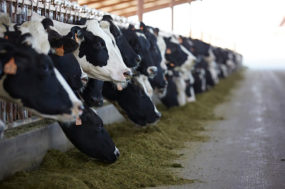The focus of their research was to develop, implement and evaluate an agricultural extension process to improve the adoption of on-farm management practices for the control of Johne’s disease on Ontario dairy farms.
Briefly, Johne’s disease is a production-limiting disease that affects dairy cows and other ruminants. All provinces, including Ontario, are proactively taking measures to prevent and control the disease.
A learner-centred extension process was implemented in Ontario, which uses an adult learning framework to facilitate behavioural change. The framework is supported by the use of experiential learning that is participatory and collaborative.
This approach, called Ontario Focus Farms, engages producers in a minimum of four full-day sessions over 12 months, where small groups discuss their on-farm problems and learn about Johne’s disease control and calf health management using a variety of techniques (e.g., farm tours, risk assessments).
The goal was for producers to learn from one another on the farm and to address their perceptions, attitudes and assumptions about Johne’s disease control. Between 2010 and 2013, more than 200 producers, across eight regions of Ontario, participated in Focus Farms.
Focus Farms was effective at influencing change on farms. Most importantly, the proportion of participants who reported making at least one on-farm change (81 percent) was significantly higher than that of control respondents (38 percent), with more than 50 percent of Focus Farms’ respondents implementing more than two on-farm changes relating to Johne’s disease control.
Furthermore, Focus Farms’ respondents significantly lowered their risk score for MAP transmission, while control respondent scores did not change.
Therefore, Focus Farms not only influenced behaviour at a level well above non-participants, but the changes implemented were viewed by veterinarians conducting the risk assessments as effective in preventing the spread of MAP.
Moreover, when producers were asked what their communication preferences were, they tended to be very mixed, suggesting there is not one communication method that is preferred by everyone.
However, more than 60 percent of producers did rank the veterinarian as their primary preference for receiving new information.
Therefore, it is imperative that agricultural extension programs utilize the veterinarian, and other farm advisers, to achieve success.
Given that small producer groups are not always possible or feasible, Roche and his team set out to create information that is engaging, clear, concise and widely available. In particular, they wanted to highlight the practicality and efficacy of some of the most common on-farm management changes for Johne’s disease control.
The result was a series of videos that use a technique called whiteboard scribing. This technique presents a series of whiteboard drawings that are sped up and cued to a narrated script.
You can watch the first of these videos, called “Johne’s Disease in Canadian Dairy Herds: What it means for farmers.
Effective agricultural extension starts with an understanding of end-user preferences and their attitudes, perceptions and opinions relating to the specific issue.
Population level extension requires multi-platform approaches that engage farmers in a number of different ways; support from veterinarians and on-farm advisers is key. It all starts by communicating with the key stakeholders and having open dialogue about the issues from each of their perspectives. PD
For more information on the results or to watch the whiteboard video, visit Dairy Research for a Healthy World.
Dairy Research for a Healthy World
Dairy Farmers of Canada (DFC) is the national policy, lobbying and promotional organization representing Canada’s farmers. DFC works to support sustainable dairy production; facilitate solutions to provincial/national challenges; provide credible research of dairy products on a national basis; and create innovative ways to grow the market.








